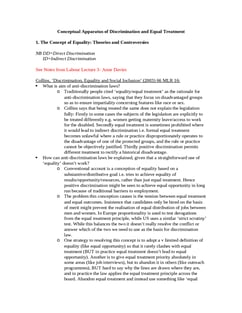Miles v Wakefield [1987] ICR 368
Judgement for the case Miles v Wakefield
Table Of Contents
Plaintiff, a registrar of births, marriages and deaths, refused to perform marriage ceremonies on Saturday mornings as part of a programme of industrial action. He carried out his duties normally, including marriage ceremonies on other days of the week.
HL held that the LA was entitled to withhold 3/37ths of his weekly pay as 3 of his 37 weekly hours were worked on a Saturday.
It was irrelevant that Plaintiff offered to work slowly on a Saturday (i.e. a go-slow) since an employer is not obliged to accept partial performance.
Lord Brightman
The same applies if the form of industrial action is a ‘go slow’ since the employee is working less than he is supposed to under his contract of employment, just like refusing to work at a particular time.
If an employee offers partial performance, as he does in some types of industrial conflict falling short of a strike, the employer has a choice.
He may decline to accept the partial performance that is offered, in which case the employee is entitled to no remuneration for his unwanted services, even if they are performed. That is the instant case.
Or the employer may accept the partial performance. If he accepts the partial performance as if it were performance which satisfied the terms of the contract, the employer must pay the full wage for the period of the partial performance …
Lord Templeman
The plaintiff was employed by the public and his industrial action took the form of declining to work efficiently on Saturday with the object of inconveniencing the public and advancing the claim of his union for higher salaries.
Industrial action is an effective method of enhancing the bargaining power of the workers' representatives. The courts are not competent to determine and are not concerned to determine whether a strike or other form of industrial action is justified or malicious...
Any form of industrial action by a worker is a breach of contract which entitled the employer at common law to dismiss the worker because no employer is contractually bound to retain a worker who is intentionally causing harm to the employer's business…
When a worker in breach of contract declines to work in accordance with the contract, but claims payment for his wages, it is unnecessary to consider the law relating to damages and unnecessary for the employer to rely on the defences of abatement or equitable set-off.
An employee can only claim wages for the period when he actually works
If the employer declines to pay, the worker need not work. If the worker declines to work, the employer need not pay.
In an action by a worker to recover his pay he must allege and be ready to prove that he worked or was willing to work … In the present case the plaintiff disentitled himself for his salary for Saturday morning because he declined to work on Saturday morning in accordance with his duty …
The plaintiff offered to work inefficiently on Saturday but could not compel the council to accept that offer, and upon their refusal to accept that offer, he ceased to be entitled to be paid for Saturday.
RELATED CASES
For Further Study on Miles v Wakefield
Need instant answers? Our AI exam tutor is here to help.
Ask questions 🙋 Get answers 📔 It's simple 👁️👄👁️
Our AI is educated by the highest scoring students across all subjects and schools. Join hundreds of your peers today.
Get StartedSimilar Cases
Related Product Samples
These product samples contain the same concepts we cover in this case.
| Labour Law | Industrial Action Notes (19 pages) |
| Labour Law | Personal Scope Of Labour Law Notes (36 pages) |

 Since 2010, Oxbridge Notes has been a trusted education marketplace, supplying high-quality materials from top achievers at universities like Oxford, Cambridge, LSE, Harvard, and Yale.
Since 2010, Oxbridge Notes has been a trusted education marketplace, supplying high-quality materials from top achievers at universities like Oxford, Cambridge, LSE, Harvard, and Yale.